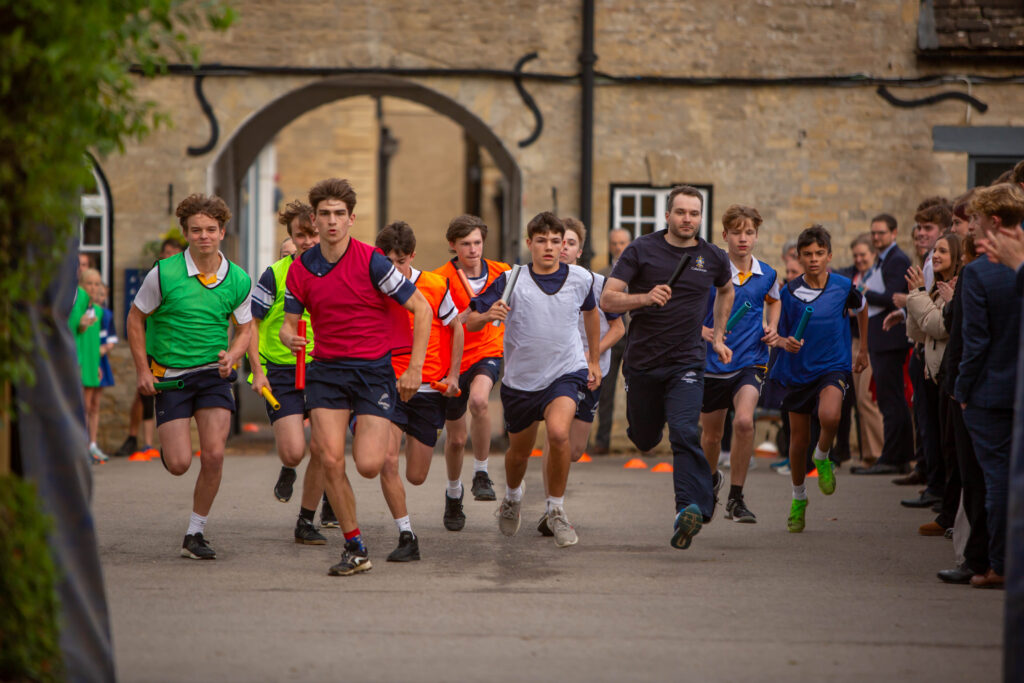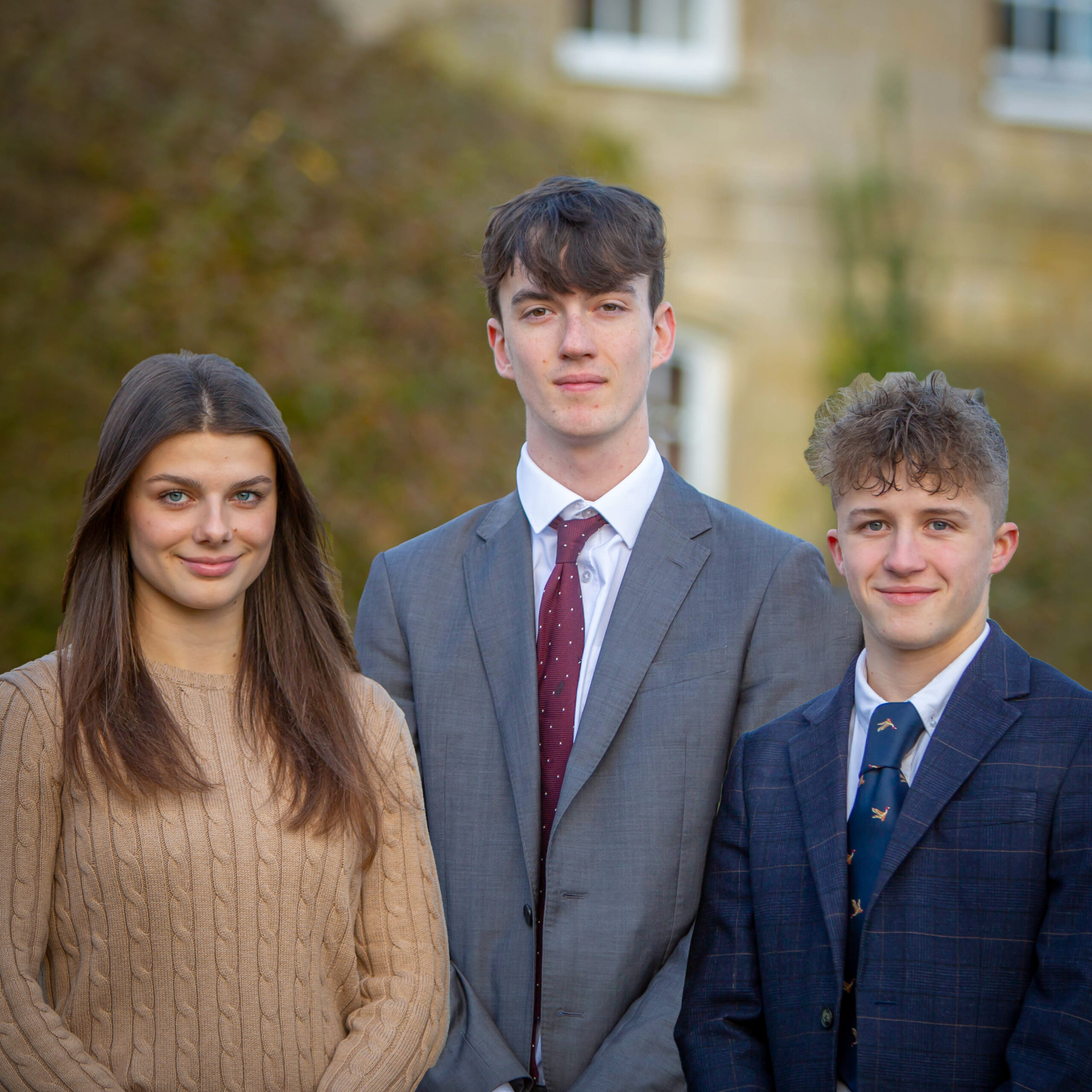Heads of Houses, Matthew, Bella, and Freddie, discuss their experience of the House system at Cokethorpe.
Talk to us about the House system – how did it support you as you went through the School?
BC – As soon as you join the Senior School, you are put into a tutor group and a House. It feels like you leave your family home and join your other family at School. I have always felt that there is a real sense of belonging. Being in your tutor group the whole way through School, you get to know everyone so well and create such strong bonds with your peers in the group. You grow up together. You are part of a smaller family within the Cokethorpe extended family.
MR – As the Head of Lower House, there is a sense of community, especially in that first year where you are in a year group rather than a House. It gives you the opportunity to really get to know your year group before joining the wider House system which can be quite daunting when you first start the Senior School. Once you are in the wider House system, you immediately feel part of it.
FM – Being part of a House has definitely supported me throughout my journey in the Senior School. It is good to have role models at the top end of the School, like the Prefects in your House who you can talk to if you have a problem or need some help with something. It creates bonds between year groups, and demonstrates that age is not a barrier to friendship.
When did you join the School?
FM – I joined the Prep School (it was the Junior School back then) in Year 3.
MR and BC – We both joined in the First Form.
So for you, Matthew and Bella, you both joined the Lower House which was your first impression of the School. How was the experience?
BC – It meant we did not go straight into the Houses, where you feel like everyone is so much older than you which can be a little terrifying when you are joining a new School! You feel more secure being surrounded by your own year group.
MR – Some of the events run by the School when we first joined really helped us to settle in, the First Form Disco and the Camp, for example. Especially for someone like me who came from a really small village primary school, to join a group of almost 100 pupils who I did not know. It really helped to break the ice and gave us the opportunity to get to know the School and our peers.
FM – I was in Symonds House in Prep School and remember being very happy when I got put in Queen Anne as both their House colours are green! It was great to meet all the new pupils. Joining the Lower House and then wider Houses from the Prep School makes you feel supported and part of something before you have even really started the Senior School.
As the Heads of Houses now, how do you support those younger pupils?
BC – I like to visit tutor groups as often as I can, so I can meet and get to know everyone individually. Although they are in Lower House, they are still part of your House. I think it is important for them to know who you are. It also means they can talk to you when they have an issue, sometimes it is easier for the younger pupils to talk to a student than a teacher as we can feel more approachable.
FM – I really enjoy seeing the younger pupils around the School and being able to say hello to them.
MR – There are also some organisational aspects to being Head of Lower House, such as organising the First Form disco. I spend time with Housemaster of Lower House, Mr O’Connor, talking about upcoming events, then getting a group of students together to organise it and ensure it is a good event which is a positive experience for the pupils. Having been to these events ourselves, we know the value of them and the important role they play in helping First Form pupils to settle.
Do you have much interaction with the Housemasters and Housemistresses?
MR – Definitely, in the Prefect meetings.
FM – We discuss anything that relates to the House, for example organising House events. This year, I helped pick the team for the Crawford Relay, we put forward names of pupils that we think might be suitable.
BC – Because you are a student yourself, you sometimes have insight into the pupils’ talents and skills of which the teachers might not be aware. It is a great way of recognising and encouraging other pupils’ talents.
FM – I also think it is really important to acknowledge the contribution tutors and other members of staff make to the Houses.
MR – I agree. For me, particularly, with Mr O’Connor, and some of the tutors when organising events and activities, you work together and create bonds.
Do you have favourite events? Why are House events important?
BC– Mine has to be House Drama, which we won last year. You see new talent coming through the School and watch pupils grow and get more confident in rehearsals. It is also a really inclusive event – whether you want to direct, act in it or work behind the scenes. It is good fun and everyone can come and watch too.
FM – For me, it would have to be the Crawford Relay. Mainly because for five out of the six years I have been here we have won it! And set records. I think it is one of the best events, as you have the whole School out watching you and cheering you on. It is a great spectator event, as well as being a fitting way to end the term.
BC – Sports Day is another great and inclusive event, there is something for everyone. It gives you a real sense of pride for your House. In the House sports events (rugby or hockey for example), we are always supported by our peers, the boys always come and watch the girls compete, and vice versa. The House system in general fosters a really healthy competitive spirit amongst pupils in a supportive environment.
MR – House Music is one of my favourites, it is really fun getting the whole House together. There is always a good sense of camaraderie, and the mood is always great on the day. The variety of competitions means every pupil gets a chance to participate – whether it be sport, art, DT, drama, music – there is something for everyone.

How did you become Head of House?
MR – Your teachers and Housemasters put you forward. A group of Prefects is then put together. You also get recommended by the year above who have just left. The final decision on who becomes the Head of House is made by Mr Stevens and Mr Ettinger.
BC – Throughout my time in the Senior School, I have always contributed to House events and School life; including music, drama and sports and really enjoyed it, I always put myself forward for as much as I can to get the most out of my time here. I think the School recognises this when they look to select the Heads of Houses.
FM – Throughout my years here, I have always looked up to the Heads of Houses. Observing them enabled me to see the qualities they had, which I then looked to evaluate. It has been one of my goals and something I have aspired to do. This also motivated me to get involved in as much as I could throughout my time in the lower years of the Senior School.
Is it a lot of responsibility for you?
FM – Your main responsibility is to be a good role model around School, looking presentable and making sure everyone else is too. You are there to have a positive influence on the pupils in your House.
BC – You have a responsibility to get to know a little bit about everyone in your House, so you have a way to connect with everyone in your House on a personal level.
MR – Also organising events, you have to put yourself forward and get the job done.
How do you manage the role alongside your studies?
BC – It is a lot to manage – but can also be a welcome break from your studies too. House events add lots of fun for everyone involved, and are a nice break from the routine of the school day.
MR – It definitely tests your organisational skills and challenges you, but in a positive way.
What are your main responsibilities?
FM – Organising events and assemblies, every two weeks we have a House Assembly. Sometimes the Housemaster or Housemistress will ask you to contribute something to the Assembly.
BC – It is so important as a Head of House to lead by example and demonstrate leadership skills, the School places a lot of value in it. Engaging in Assemblies is one of the ways you can do that. When younger pupils see you contributing it encourages them to do the same, as well as giving them more confidence.
FM – The long-term goal, of course, is to win the House Cup at the end of the year!
MR – It is slightly different for me, mine is to instil that sense of belonging in the Lower House and being a positive influence on the younger pupils.
Why would you recommend being a Head of House to other pupils?
MR – It brings you together as a group, especially the Prefect body, and gives you a real sense of community. We all sensed Dee (Upper Sixth, Gascoigne) would be Head of School, but we waited for her and congratulated her. We come together as a body.
FM – On a personal level it is nice to be recognised for everything you have done and contributed throughout the Senior School. You have been involved in the House, and you have trust put in you to be given the role.
What qualities do you think you need to be a Head of House?
MR – Well, certainly the six Leadership Traits: Integrity, Courage, Empathy, Judgment, Ambition and Responsibility. These underpin the ethos of the Prefect body and what we are trying to model to the younger years.
BC – You also need confidence, and the ability to speak in public.
FM – You need to be multiskilled. Our Heads of Houses this year have a diverse range of skills, which is fantastic. You need to be motivated and enthusiastic about all House events, not just ones you are good at or are your favourites!
BC – I look forward to handing over the baton next year, we are always keeping an eye on the Lower Sixth to see who might have the potential to take over the role. It is always lovely to give someone else the opportunities that you have had.
FM – It really is a huge honour to be chosen, you have been chosen for a reason and it is important to remember that.
